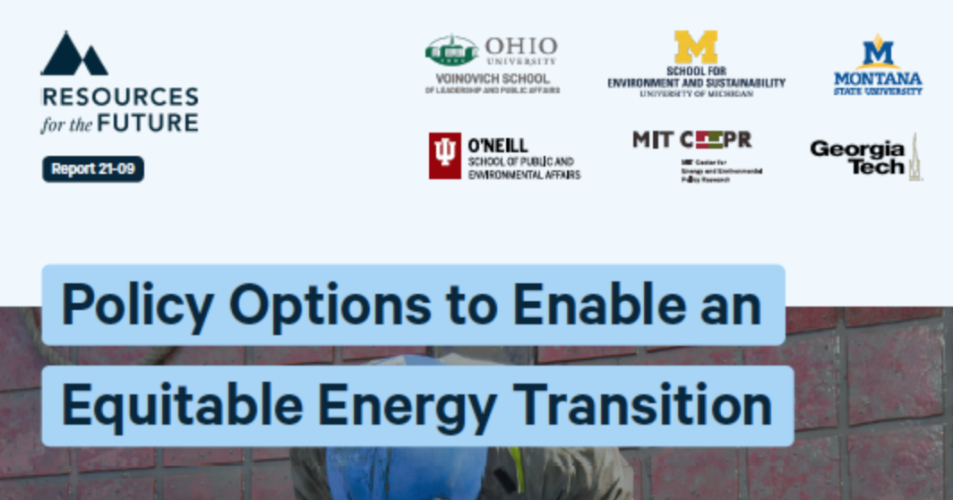
On the path to an equitable energy transition, Ohio University faculty contributes insight on how to get there

In light of the Biden administration’s recent pledge to cut US emissions by 50–52% from 2005 levels, a new report led by Resources for the Future lays out the costs and benefits of policies that can reduce emissions while promoting fairness for communities affected by the transition to clean energy.
Gilbert Michaud, assistant professor of practice at Ohio University’s Voinovich School of Leadership and Public Affairs, was one of the report’s 15 contributing authors from universities across the U.S., which serves up a “menu” of 35 policy options to help workers and communities adapt in the energy transition.
“It is clear that the new federal administration is seeking innovative ways to facilitate the energy transition,” Michaud said. “Our report investigates federal policy approaches to ensure a more equitable and sustainable transition to clean energy, with topics such as infrastructure and workforce in mind. Acknowledging that there is not one simple solution to these complex issues, our report outlines a suite of different options for policymakers to consider, broken down by costs, benefits, timeline and related variables.”
The report analyzes policy options that touch on specific categories: energy infrastructure and resilience, environmental remediation, economic development, workforce, and manufacturing and innovation. Each researcher identified specific proposals and drew from available evidence to assess policy design and estimate outcomes, including effects on the environment, economy, and employment. Many of the proposals analyzed in this report are currently under consideration in Congress, and the report’s authors have identified relevant pieces of legislation and sections of the US Code.
“Achieving an equitable energy transition will require many policy pieces,” RFF Fellow and report editor Daniel Raimi said. “We hope that the pros, cons, and other considerations we have laid out in these pages can better inform decisionmakers and others about the potential effects of different policy options.”
Previous RFF research has stated that there is no “silver bullet” solution to supporting an equitable energy transition. However, policymakers in the United States and around the world will make decisions in the coming years about how best to implement fair policies as the energy landscape changes. This report, while not a comprehensive package, seeks to provide broad insight on the best path forward.
“In particular, my contribution related to economic development considerations of the energy transition, such as ensuring adequate housing and access to broadband,” Michaud said. “As communities face new challenges with unfolding energy transitions from fossil fuels to renewables, we need to ensure proper physical, labor, and financial resources to enable economic growth, especially in rural or marginalized areas.”
For more, read the report, Policy Options to Enable an Equitable Energy Transition. RFF Fellow Daniel Raimi served as editor and the following scholars provided their insights:
- Aurora Barone (Environmental Defense Fund)
- Sanya Carley (Indiana University)
- David Foster (Massachusetts Institute of Technology)
- Emily Grubert (Georgia Institute of Technology)
- Julia Haggerty (Montana State University)
- Jake Higdon (Environmental Defense Fund)
- Michael Karney (Massachusetts Institute of Technology)
- David Konisky (Indiana University)
- Jennifer Michael (Resources for the Future)
- Gilbert Michaud (Ohio University)
- Sade Nabahe (Massachusetts Institute of Technology)
- Nina Peluso (Massachusetts Institute of Technology)
- Daniel Raimi (Resources for the Future)
- Molly Robertson (Resources for the Future)
- Tony Reames (University of Michigan)
To learn more about RFF’s work on an equitable energy transition, read about our joint project with Environmental Defense Fund, Fairness for Workers and Communities in Transition.
